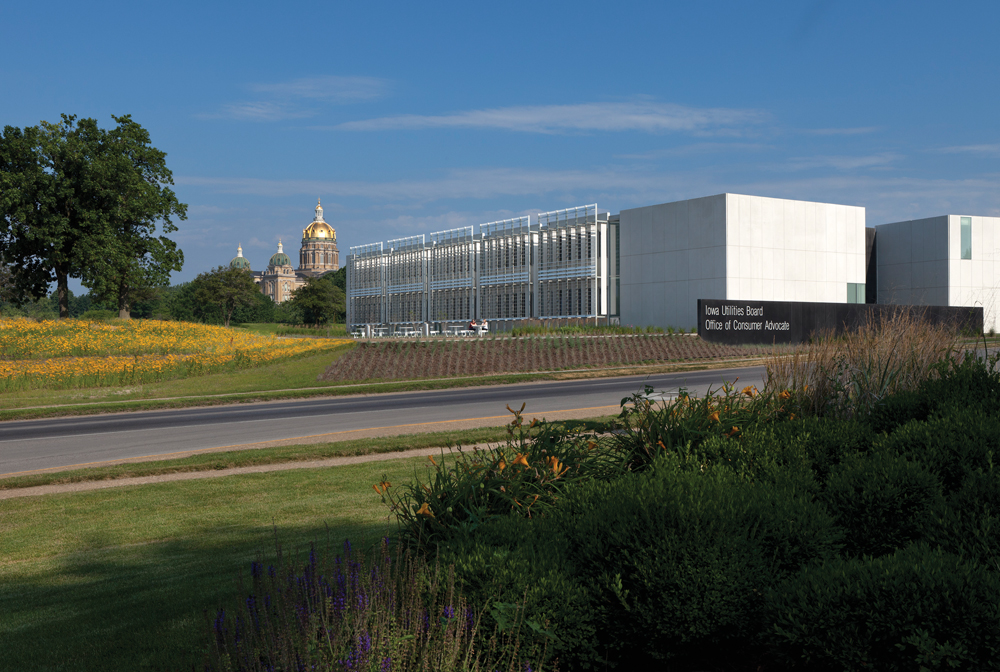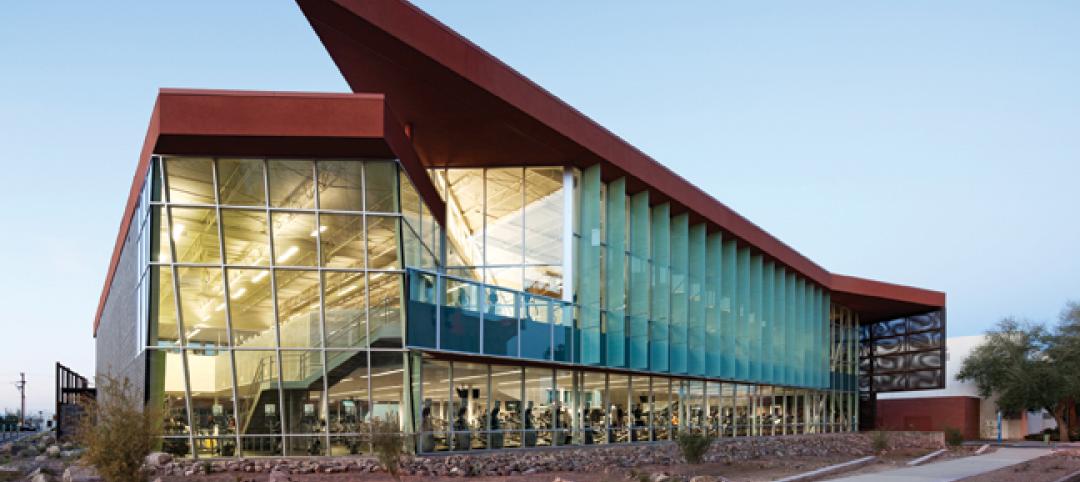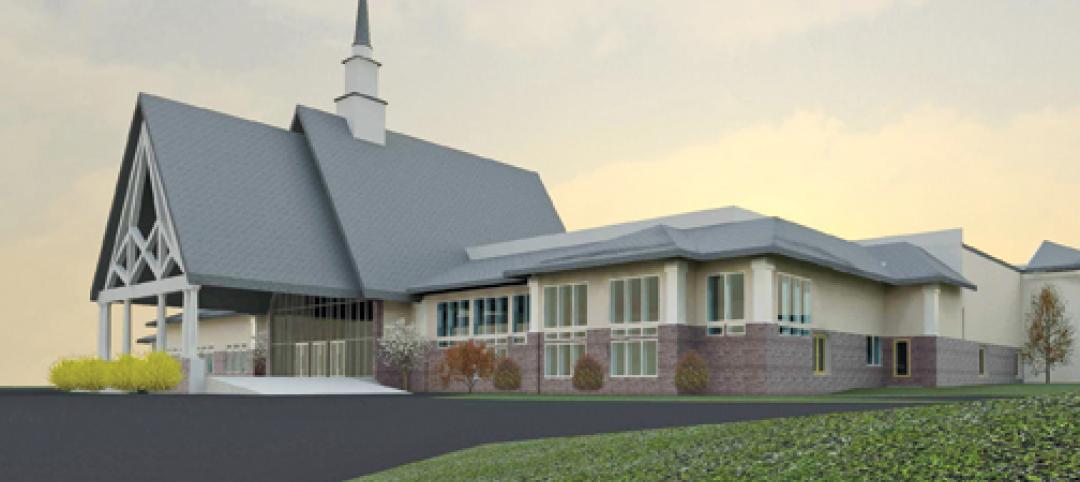With the economy picking up, many stalled government contracts are reaching completion and earning their green credentials. A typical example: 50 United Nations Plaza, in San Francisco. Originally built in 1936, the $121 million renovation—financed from ARRA stimulus funds—is on the way to becoming the first General Services Administration historic renovation to achieve LEED Platinum. The 350,000-sf building will become GSA’s Region 9 headquarters.
Other federal projects are a bit more offbeat. For example, the newest land port of entry in the U.S. (there are 167), designed by Julie Snow Architects, opened earlier this year in Van Buren, Maine. The 46,516-sf facility should gain LEED Gold certification, thanks to its highly efficient glazing and curtain wall, geothermal heating/cooling, zoned lighting, LED fixtures, occupancy sensors, and solar hot water system.
The port of entry, which replaced a flood-damaged facility, is responsible for 160 miles of the border with Canada. To balance security with surveillance capability, the main work areas are largely clad in glass fritted with a silk-screen pattern that provides both camouflage and glare protection.
WHERE GREEN (NOT ORANGE) IS THE NEW BLACK
Balancing security with sustainability, the Building Team for the 532,147-sf Wake County Detention Center, Raleigh, N.C., earned LEED Silver honors. The facility, which can hold 1,152 inmates, also houses city/county offices and a courtroom. Sustainable features include LED lighting, high-efficiency plumbing (saving 282,000 gal/year), and condensate recovery (another six million gal/yr in water savings).
Ten-hut! AEC firms fall in for military service
The Defense Department is a rich source of revenue for AEC firms like HDR Architecture and Mortenson Construction, which have teamed up on the design-build of a $94.9 million barracks complex for the 13th Combat Aviation Brigade at Fort Carson, Colorado Springs, Colo. The trio of four-story apartment buildings, totaling 370,156 gsf, will be built to LEED Gold standards. Solar walls, solar hot water panels, and PV arrays—which will generate a fourth of the annual energy needs for the building—will make the complex net-zero-energy ready.
At the National Naval Medical Center in Bethesda, Md., the JV design-build team Walbridge/Brasfield & Gorrie has completed the 151,450-sf Naval Exchange and 500-space parking structure. Constructed to antiterrorism/force protection standards, it replaced a much smaller 20-year-old exchange.
Designed by CMH Architects to LEED Gold levels, the Bethesda NEX was built partially into a hillside to take advantage of the earth’s insulating capabilities. A 53,000-sf green roof and extensive stormwater management system provide 11,200 cubic feet of rainwater harvesting. The exchange offers military families grocery and other retail stores, plus a dry cleaner, pharmacy, spa, wine shop, credit union, florist, food court, and optical center.
In Iowa, a new state penitentiary for 800 offenders nearing completion in Fort Madison represents a fundamental shift by the state corrections department toward more humane treatment of prisoners—including more environmentally friendly design.
The 475,000-sf facility uses a thousand or so geothermal wells to provide independent heating/cooling to its eight units. Ample daylighting is provided to inmate cells through a mechanical chase that acts as a tempered buffer zone to the unusually large cell windows.
“From a security viewpoint, this ‘back zone’ allowed us to reduce the thickness of the glass, which saved a lot of money,” says Michael Morman, AIA, LEED AP BD+C, Architect/Project Manager with Shive-Hattery, architect/engineer on the $132 million project. (Also on the Building Team: TOK, owner’s rep; HOK, design architect/engineer; Venture, AOR; The Weidt Group, utility partner; PBA, detention specialist; and the Walsh Group, GC.) “That allowed more windows, more daylighting, and easier maintenance, to get rid of the Alcatraz look.”
To control stormwater on the 42-acre site, the Building Team devised a catchment system that carries runoff to vaults and discharges it under the fence through eight-inch-diameter pipes, making a “Shawshank Redemption” escape impossible. The new prison, which will open early next year, is set to earn Gold under the LEED Campus (v2.2) program.
AIA COTE HONORS—AND MORE
The Hawkeye State is also home to one of the nation’s most energy-efficient new buildings, the Iowa Utilities Board/Office of Consumer Advocate Building, in Des Moines. The 44,500-sf office building not only made LEED Platinum, but also hit an Energy Star rating of 100 on the way to garnering a Top 10 Green Project from the AIA Committee on the Environment.
The $10 million, double-wing building, which opened in March, is projected to have an energy use of 28.0 kBtu/sf/year. Sustainable features include operable windows, six acres of native prairie restoration, stormwater management, water use reduction of 46%, and 12.5% of total energy use supplied by roof-mounted PVs.
Not to be outdone, the City and County of San Francisco Public Utilities Commission recently earned LEED Platinum for its new 13-story, 277,500-sf office building. The $146.5 million project won a Top Ten Plus Project Inaugural Award from AIA COTE. Its carbon footprint is half that of comparable buildings, due in part to a sculpted façade which channels air toward wind turbines that provide power to the building.
Related Stories
| Nov 9, 2010
Designing a library? Don’t focus on books
How do you design a library when print books are no longer its core business? Turn them into massive study halls. That’s what designers did at the University of Amsterdam, where they transformed the existing 27,000-sf library into a study center—without any visible books. About 2,000 students visit the facility daily and encounter workspaces instead of stacks.
| Nov 9, 2010
Turner Construction report: Green buildings still on the agenda
Green buildings continue to be on the agenda for real estate owners, developers, and corporate owner-occupants, according to the Turner 2010 Green Building Market Barometer. Key findings: Almost 90% of respondents said it was extremely or very likely they would incorporate energy-efficiency improvements in their new construction or renovation project, and 60% expected to incorporate improvements to water efficiency, indoor environmental quality, and green materials.
| Nov 5, 2010
New Millennium’s Gary Heasley on BIM, LEED, and the nonresidential market
Gary Heasley, president of New Millennium Building Systems, Fort Wayne, Ind., and EVP of its parent company, Steel Dynamics, Inc., tells BD+C’s Robert Cassidy about the Steel Joist Manufacturer’s westward expansion, its push to create BIM tools for its products, LEED, and the outlook for the nonresidential construction market.
| Nov 3, 2010
First of three green labs opens at Iowa State University
Designed by ZGF Architects, in association with OPN Architects, the Biorenewable Research Laboratory on the Ames campus of Iowa State University is the first of three projects completed as part of the school’s Biorenewables Complex. The 71,800-sf LEED Gold project is one of three wings that will make up the 210,000-sf complex.
| Nov 3, 2010
Park’s green education center a lesson in sustainability
The new Cantigny Outdoor Education Center, located within the 500-acre Cantigny Park in Wheaton, Ill., earned LEED Silver. Designed by DLA Architects, the 3,100-sf multipurpose center will serve patrons of the park’s golf courses, museums, and display garden, one of the largest such gardens in the Midwest.
| Nov 3, 2010
Public works complex gets eco-friendly addition
The renovation and expansion of the public works operations facility in Wilmette, Ill., including a 5,000-sf addition that houses administrative and engineering offices, locker rooms, and a lunch room/meeting room, is seeking LEED Gold certification.
| Nov 3, 2010
Sailing center sets course for energy efficiency, sustainability
The Milwaukee (Wis.) Community Sailing Center’s new facility on Lake Michigan counts a geothermal heating and cooling system among its sustainable features. The facility was designed for the nonprofit instructional sailing organization with energy efficiency and low operating costs in mind.
| Nov 3, 2010
Seattle University’s expanded library trying for LEED Gold
Pfeiffer Partners Architects, in collaboration with Mithun Architects, programmed, planned, and designed the $55 million renovation and expansion of Lemieux Library and McGoldrick Learning Commons at Seattle University. The LEED-Gold-designed facility’s green features include daylighting, sustainable and recycled materials, and a rain garden.
| Nov 3, 2010
Recreation center targets student health, earns LEED Platinum
Not only is the student recreation center at the University of Arizona, Tucson, the hub of student life but its new 54,000-sf addition is also super-green, having recently attained LEED Platinum certification.
| Nov 3, 2010
New church in Connecticut will serve a growing congregation
Tocci Building Companies will start digging next June for the Black Rock Congregational Church in Fairfield, Conn. Designed by Wiles Architects, the 103,000-sf multiuse facility will feature a 900-person worship center with tiered stadium seating, a children’s worship center, a chapel, an auditorium, a gymnasium, educational space, administrative offices, commercial kitchen, and a welcome center with library and lounge.
















